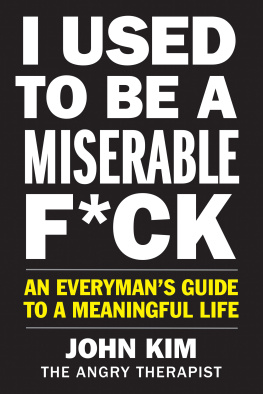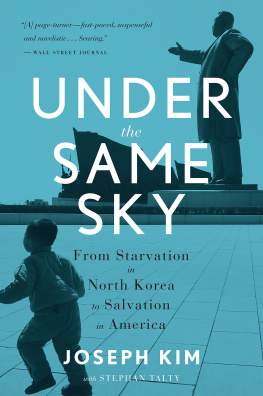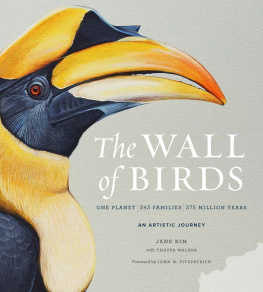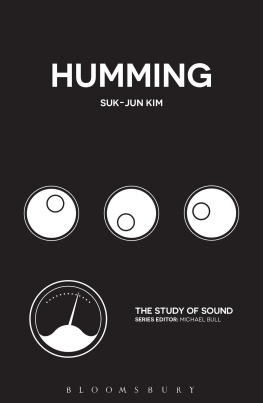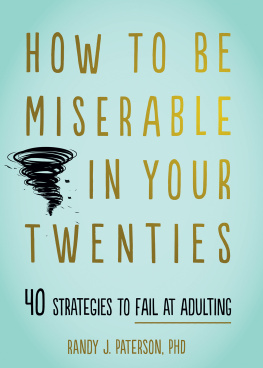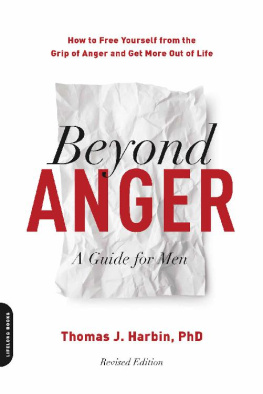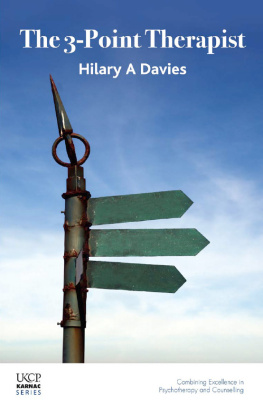I USED TO BE A MISERABLE F*CK . Copyright 2019 by The Angry Therapist, LLC. All rights reserved under International and Pan-American Copyright Conventions. By payment of the required fees, you have been granted the nonexclusive, nontransferable right to access and read the text of this e-book on-screen. No part of this text may be reproduced, transmitted, downloaded, decompiled, reverse-engineered, or stored in or introduced into any information storage and retrieval system, in any form or by any means, whether electronic or mechanical, now known or hereafter invented, without the express written permission of HarperCollins e-books.
Cover design: HarperCollins
FIRST EDITION
Library of Congress Cataloging-in-Publication Data is available upon request.
Digital Edition JANUARY 2019 ISBN: 978-0-06-285635-7
Version 02132019
Print ISBN: 978-0-06-285634-0
This book is dedicated to anyone who has been in a dark place. Who has felt lost or disconnected. Cursed their birth. Survived a shattered heart, held shitty jobs, gone through toxic relationships, and wrestled with uncertainty. Anyone who has felt grayed out and purposeless. Ugly, washed-up, wishing there was more, better, or different. This book is dedicated to anyone who has ever felt like a miserable f*ck.
Resist nothing.
The ultimate measure of a man is not where he stands in moments of comfort and convenience, but where he stands at times of challenge and controversy.
MARTIN LUTHER KING JR .
The problem is, God gave man a brain and a penis and only enough blood to run one at a time.
ROBIN WILLIAMS
When I was going through my divorce, I picked up a book. It was a book about men titled The Way of the Superior Man, by David Deida. Id never read a book about men before. I didnt even know books about men existed or what to expect from reading one. That book ended up changing my life. It was the first domino to fall in the long Heros Journey that followed. That journey changed the way I thought, ate, loved, and moved. It challenged my thinking, my definitions, and my beliefs about myself. It gave me new lenses, a sense of purpose, and it repositioned me with fire in my belly to help other men on their path.
During this process, my definitions about manhood changed. I learned that they had been distorted by parents, society, advertising, and locker rooms. They were damaging. Kept me in a tight box, turning me into a cardboard cutout instead of a real growing and evolving man. I was a walking should, living other peoples definitions instead of my own. So I cleared the slate and started over, leaned into the new, the unknown; I slayed some dragons, bought a motorcycle, got some tattoos, and grew some real balls. Not the kind that action movies are made of. But the kind that remind you that they are uneven, because you are human. I came back to the village a different person. No longer a poster. But a real person with new definitions and a mirror to check more than my hair.
My intent in writing this book isnt to put my definitions on you. Its to create a dialogue and challenge your own beliefs about what it looks like to be a man. My hope is that it encourages you to think about who you are now and who you want to be, and gives you the motivation to close that gap. Im not here to lecture you. Im coming with you, not at you. Talking to you like one of my friendsthe men I sweat with, eat with, ride motorcycles with, get crepes and share my fucking feelings with. Yes, real men eat crepes.
You may have seen from my bio that I am a therapist. Thats true. But I am not coming at you here just as a therapist. I am doing this with you, as a brother. As a fellow human. And although we may sometimes talk about women and relationships, this isnt about Mars or Venus. About us versus them. This is about being a better version of yourself. Plain and simple. Its about connection. Discovery. Building. Its about evolving, expanding, and living closer to your truth and potential. Not only for you, but for all of us.
Because the world desperately needs present fathers, loyal brothers, loving boyfriends, strong husbands, vulnerable leaders, and sharp men to sharpen other men.
We need to take back ownership of the role that men play in our world.
Its time for our return.
John Kim, the Angry Therapist
B oys get their definitions of manhood, strength, love, and self from watching other menspecifically, their dads. But we live in a fatherless nation. I learned this firsthand when I was working as a therapist at a nonprofit, treating teenagers for addiction. After working with hundreds of teens and their parents, I realized that the common thread in over 95 percent of these troubled teens was an absent father. Dad was either physically or emotionally gone. The girls stood too close to me, desperate for Dads attention, and, without anyone to teach them boundaries, were easily confused in social interactions with authority figures. But after my weeks of working with them, they quickly picked up on social cues and acceptable ways to communicate.
The boys were another story. Many of them mimicked everything I did, following me around, looking for an example of how to do the most mundane, obvious things. A few of them were confrontational, hoping for a connection with another man but never taught how to receive male affection or attention without posturing, panicking, and showing physical aggression. Both behaviors, I realized, stem from not having a positive, healthy male role model at home, and both behaviors can follow middle-schoolers into high school, then college, then the workplace, and into relationships with family members, colleagues, and loved ones for the rest of their lives. Unlike the girls, the boys didnt learn quickly. They were, truthfully, lost.
The boys I worked with were growing up stunted, with a warped definition of man. Throw in manipulative advertising, toxic locker rooms, and todays scroll-and-swipe culture that promotes instant gratification and hiding, and its no surprise that many of these boys go on to define themselves by having muscles or a corner office, learning about love, sex, and intimacy through dating apps and pornography. For many boys, intimacy is only skin-deep, and courting a potential partner is something they do while sitting on the toilet on their phone, where they never learn to communicate or experience true connection. Ultimately, their relationships fail, and because they dont know what healthy feels like or have no tools to fix whats broken, they fall into unhealthy relationship loops that prevent learning and growth. Such a boy has now created his own prison. Perhaps he forms unhealthy beliefs about himself, women, and love. Im not good enough. Im not lovable. This may lead to anger and coping strategies like addictions, ghosting, and passionless communicationthings that only disconnect him from his self. He may feel debilitating shame or guilt, and he may even lash out at his partner, his family, or perfect strangers. He becomes a predator. Now suddenly he experiences isolation, depression, and more false beliefs, which are fueled by more flawed and ineffective reactions. Women now become objects. Or, more accurately, prey.
Regardless of the specific road that leads him there, all paths like the one above lead to the same place: men everywhere feeling lost or misunderstood, living without purpose and passion, and needing to inflate physical or superficial details to make up for whats lacking on the inside. Or giving up altogether.
And all of this impacts us directly. In the US alone, according to the American Foundation for Suicide Prevention, forty-five thousand people commit suicide each year. Out of those, 79 percent are men. While women are more prone to having suicidal thoughts, men are more likely to actually do it. Some six million men in America are diagnosed with depression annually. While depressed women are more likely to report feelings of sadness, helplessness, and guilt, men are more likely to suffer in silence and not seek treatment. Researchers say it is often more difficult for men to identify their illness. Men with depression are more likely to report fatigue, irritability, and loss of interest in work. You probably dont need me to tell you that 99 percent of mass shootings are reportedly done by men.

